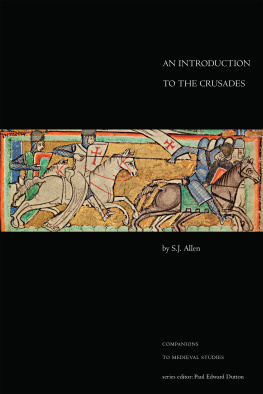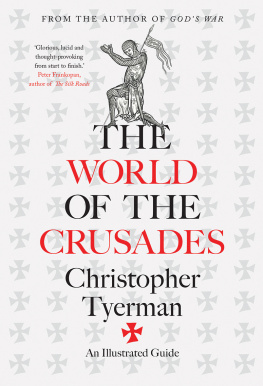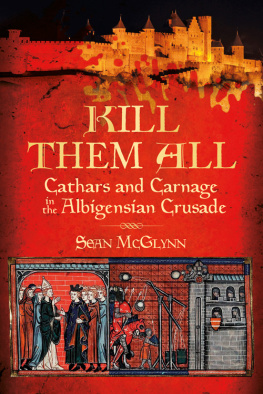CHRONICLES
OF
THE CRUSADES
CONTEMPORARY NARRATIVES OF THE
CRUSADE OF RICHARD CUR DE LION
BY
RICHARD OF DEVIZES AND GEOFFREY DE VINSAUF
AND OF THE
CRUSADE OF SAINT LOUIS
BY
LORD JOHN DE JOINVILLE
WITH ILLUSTRATIVE NOTES AND AN INDEX
[
Reprinted from Stereotype plates.]
PREFACE.
THE present volume comprises the three most interesting contemporary Chronicles of the Crusades which have been handed down to us; two of them recording very fully the romantic deeds of our lion-hearted Plantagenet; the third the chivalric career of the pious and exemplary Saint Louis of France.
Of the author of the first of these Chronicles, Richard of Devizes, nothing is known beyond what he himself informs us in his preface, by which it appears, that he was in early life a monk of St. Swithins Priory at Winchester, and subsequently a Carthusian of Witham. Other works have been ascribed to the same writer, but there is great uncertainty as to their authorship. His Chronicle is valuable, because it connects affairs which were passing in England with the events which took place simultaneously in the Holy Land. The original Latin was first published by the English Historical Society, under the editorial care of the Rev. Joseph Stevenson. From that edition, a translation was made by the Rev. Dr. Giles, in 1841, which is here reprinted, with occasional emendations by himself.
The second work in this series is the History of the Expedition of Richard Cur de Lion to the Holy Land, by Geoffrey de Vinsauf (or Vinosalvo). Little is known of this author, but the peculiarity of his name has given rise to several ingenious conjectures as to its etymology. Some derive it from Vin and sauver, and suppose he may have had the custody of wine in his monastery; others from the German words Wein and sauffen, which would imply tippling. Others, again, suppose that he may have been superintendent of the vineyard, the wine-pressing, preserving, &c. Pits, somewhat in confirmation cf this latter notion, cites a MS. which he saw in Caius College, Cambridge, written by one Geoffrey, on preserving wines and fruits, and on grafting.
Whatever may be the true derivation of his name, Geoffrey is generally believed to have been an Englishman by birth, but of a Norman family. His writings are numerous, and several of them poetical. The following are the principal:
On preserving Wines, Fruits, &c. (De Vinis, fructibus, &c., conservandis).
Itinerarium Regis Anglorum Richardi, et ahorum in Terram Hierosolymorum.
To the Emperor Henry, about liberating King Richard (Ad Csarem, &c.).
Monody on the Death of King Richard (Monodia, &c.).
To William Lon, champs, Bishop of Ely, and Chancellor (Ad Wilhelmum, &c.).
Of the State of the Roman Court (De Statu Curi Roman).
Manual or Handbook (Enchiridion).
On New Poetry (De Poetria Nova).
On Rhetoric (De Arte dicendi).
On Ethics (De Rebus Ethicis).
But of all his works, the most important and intrinsically valuable is his History of the Third Crusade, under Richard the First of England and Philip Augustus of France. It is the only Chronicle written by an eye-witness, of those furious assaults which the army of Saladin made upon the Christians, and of the firmness with which the lion-hearted Richard withstood and repulsed them. If the reader takes the trouble of comparing Geoffreys full and interesting account of the Crusade with that of Richard of Devizes, he will perceive how much superior it is in every respect. Geoffrey lived to see the death of King Richard, and the accession of his brother John, and it is much to be lamented that he breaks off his history, somewhat abruptly, just at the moment when the Crusaders embark on board ship to leave the Holy Land, at the end of the year 1192. The original of this interesting record was printed for the first time complete in the second volume of Gale and Fells Collection in 1687, but fragments had previously been given by Bongars in his Gesta Dei per Francos. The present translation is the conjoint labour of a classical scholar and a gentleman well read in Medival history; a mode of proceeding which, after some experiment, it was found advisable to adopt, our authors corrupt Latin being frequently so vague and uncertain as to defy the best scholar who has not made the lore of the middle ages his particular study.
The third and last, and by no means the least interesting work in this volume, is Joinvilles Memoirs of Saint Louis, the crusading king of France. The translation is by Colonel Johnes, of Hafod, and is given entire, with all the notes which are really illustrative of the author. Head-lines, dates, and an index have been added; which have, at least, this merit, that no previous edition, either English or French, has any of these useful accompaniments. The Biographical Sketch of Joinville is compiled from Colonel Johness materials, the Biographie Universelle, and other sources.
H. G. B.
August, 1848.
RICHARD OF DEVIZES.
PROLOGUE.
To the Venerable Father Robert, his very good Lord, formerly Prior of the Church of Winchester, health to persevere in the good work he has begun, his faithful servant Richard, surnamed of Devizes, sends greeting:
SECT. 1. AFTER you had happily proceeded to the Charter House* from our church of Winchester, much and often did I desire to follow you who had thus departed, peradventure to remain with you, but certainly to behold what you were about, how you lived, and whether the Carthusian cell is more exalted and nearer heaven than the cloister of Winchester. It pleased God at length to satisfy my wish. I came, and oh that I had come alone! I went thither making the third, and those who went with me were the cause of my return. My desire displeased them, and they caused my fervour, I will not say error, to grow cold. I saw with you that which elsewhere I had not seen, which I could not have believed, and which I could not sufficiently admire. In each of your cells there is one door according to custom, which you are permitted to open at pleasure, but to go out by it is not permitted, except so much as that one foot should always remain in the cell, within the threshold. The brethren may step out with one foot, whichever they please, but the other must remain in the cell. A great and solemn oath is to be taken that the door by which it is not permitted to enter or depart should be kept open. I am astonished also at another thing; abounding in all the good things of this world, as having nothing, yet possessing all things, more compassionate and humane than all men, having the most perfect love one to another, you divide the affection of charity to strangers, you bless without giving supplies to your guests. Nor do I less admire, in the third place, that living to yourselves apart out of society, and singly, you understand all the great things achieved in the world as they happen, and even sometimes you know them prior to their being accomplished. Do not, however, consider it want of respect in me to your more than Pythagorean taciturnity, if I shall dare presume to address men of so great gravity, and so arduous profession, rather with the trifles of the world than mere idle gossip.













